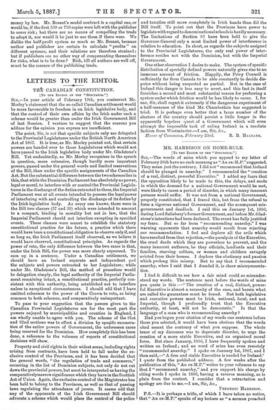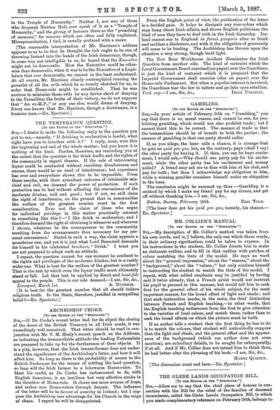MR. HARRISON ON HOME-RULE.
[To Tau EDITOR or THE " SPECTATOR.") SIR,—The words of mine which you append to my letter of February 26th have no such meaning as "An ex-M.P." suggested. They mean just the contrary. I did not" recommend that Ireland should be plunged in anarchy." I recommended the "creation of a real, distinct, powerful Executive." I added my fears that the opposition likely to be made to this, the delays, and mode in which the demand for a national Government would be met, were likely to cause a period of disorder, in which many innocent persons would suffer. It was not from a national Government, properly constituted, that I feared this, but from the refusal to form a vigorous national Government, and the consequent mis- government and deadlock. I said this on January let, 1886, during Lord Salisbury's former Government, and before Mr. Glad- stone's intentions had been declared. The event has fully justified my fears. But so far from "recommending anarchy," I was warning opponents that anarchy would result from rejecting our recommendation. I feel and deplore all the evils which haveresulted from that rejection,—the paralysis of the Executive, the cruel deeds which they are powerless to prevent, and the many innocent sufferers, be they officials, landlords and their families, starving colliers, or women and children savagely evicted from their homes. I deplore the obstinacy and passion which prolong this misery. Bat to say that I recommended anarchy, when I said that I dreaded it, is sheer misrepresenta- tion.
I find it difficult to see how a fair mind could so misunder- stand my words. The sentence next before the words of mine you quote is this :—" The creation of a real, distinct, power- ful Executive is almost a necessity of the case, and herein what are called the guarantees must be found. But both legislative and executive powers must be Irish, national, local, and not Imperial, though I profoundly trust that the Executive authority, at least, will not be democratic." Is that the language of a man who is recommending anarchy ?
Had you begun your citation of ray words one sentence before
those you selected, it would have been obvious that the words cited meant the contrary of what you suppose. The whole tenor of my discourse was to deprecate disorder, to urge the creation of a more stable Executive, and an organised moral force. But since January, 1886, I have frequently spoken and written on Ireland ; and no word of mine has even remotely "recommended anarchy." I spoke on January let, 1887, and I then said,—"A firm and stable Executive is needed for Ireland: I quote from the published address. A few weeks after the publication of this, "An ex-M.P." writes to your columns to say that I "recommend anarchy," and you support his charge by citing words I spoke in 1886, having a reverse meaning, as is plain from the context. I consider that a retractation and apology are due to me.—I am, Sir, Sce.,
FREDERIC HARRISON.
P.S.—It is perhaps a trifle, of which I have taken no notice, that " An ex-M.P." speaks of my lecture as " a sermon preached
in the Temple of Humanity." Neither I, nor any of those who frequent Newton Hall, ever speak of it as a " Temple of Humanity," and the giving of lectures there as the "preaching of sermons," for reasons which are often and fully explained. Misrepresentation, I find, is usually prefaced with a sneer.
[The reasonable interpretation of Mr. Harrison's address appears to ns to be that he thought the risk ought to be run of throwing Ireland into the hands of the Irish democracy, though, in some way not intelligible to us, he hoped that the Executive might not be democratic. How the Executive could be other- wise than democratic, when it was to be the Executive of a Legis- lature that was democratic, we cannot in the least understand. At all events, Mr. Harrison clearly contemplated running the gauntlet of all the evils which he so tersely sketched for us, in order that Home-rule might be established. That he was anxious to minimise those evils by any device short of denying to the Parnellites the fruits of their victory, we do not suppose that "An ex-M.P.," or any one else, would dream of denying. Every one knows that Mr. Harrison, though a doctrinaire, is a humane man.—En. Spectator.]



































 Previous page
Previous page